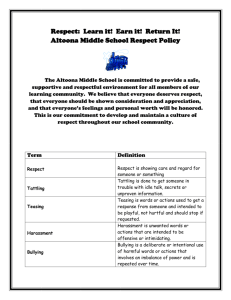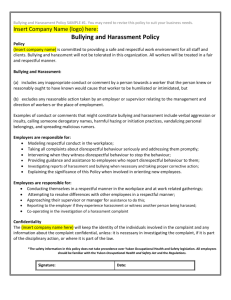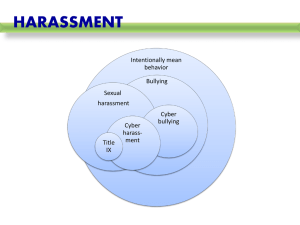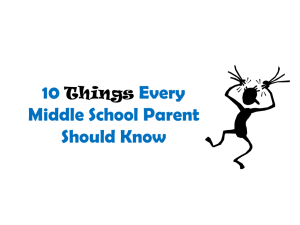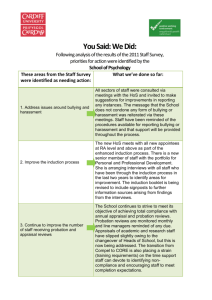ANTI- HARASSMENT / BULLYING POLICY Rationale: Harassment
advertisement
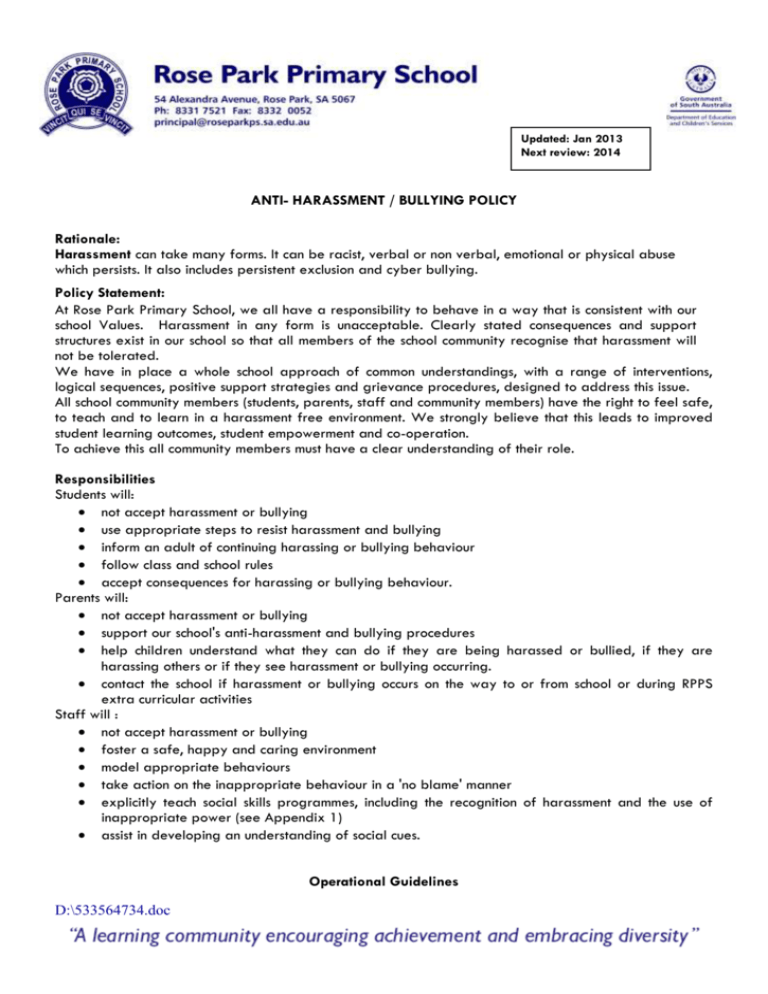
Updated: Jan 2013 Next review: 2014 ANTI- HARASSMENT / BULLYING POLICY Rationale: Harassment can take many forms. It can be racist, verbal or non verbal, emotional or physical abuse which persists. It also includes persistent exclusion and cyber bullying. Policy Statement: At Rose Park Primary School, we all have a responsibility to behave in a way that is consistent with our school Values. Harassment in any form is unacceptable. Clearly stated consequences and support structures exist in our school so that all members of the school community recognise that harassment will not be tolerated. We have in place a whole school approach of common understandings, with a range of interventions, logical sequences, positive support strategies and grievance procedures, designed to address this issue. All school community members (students, parents, staff and community members) have the right to feel safe, to teach and to learn in a harassment free environment. We strongly believe that this leads to improved student learning outcomes, student empowerment and co-operation. To achieve this all community members must have a clear understanding of their role. Responsibilities Students will: not accept harassment or bullying use appropriate steps to resist harassment and bullying inform an adult of continuing harassing or bullying behaviour follow class and school rules accept consequences for harassing or bullying behaviour. Parents will: not accept harassment or bullying support our school's anti-harassment and bullying procedures help children understand what they can do if they are being harassed or bullied, if they are harassing others or if they see harassment or bullying occurring. contact the school if harassment or bullying occurs on the way to or from school or during RPPS extra curricular activities Staff will : not accept harassment or bullying foster a safe, happy and caring environment model appropriate behaviours take action on the inappropriate behaviour in a 'no blame' manner explicitly teach social skills programmes, including the recognition of harassment and the use of inappropriate power (see Appendix 1) assist in developing an understanding of social cues. Operational Guidelines D:\533564734.doc Consequences Generally the consequences for harassment or bullying will occur in the following sequence: First incident - a warning recorded by class teacher and referred to Principal or Deputy Second incident - recorded and filed by Principal or Deputy on EDSAS. - Student spends time in Time out room - Time out documentation goes home to parents - contact made with parents. Third incident - May lead to external suspension. - May lead to a behaviour management plan being developed for the student between the Principal, the Reg. Behaviour Man. Coordinator, the student's parents and student. If the incident is severe the warning and/or time out room may not apply, fast tracking to suspension. Appendix 1 Support Strategies Regular staff training, development and information sessions. Use of the Learner Profile as part on ongoing classroom work on values and skills of global citizens Classes developing an Essential Agreement on appropriate behaviours and response to inappropriate behaviours Social Skills lessons related to: o school values and vision o defining harassment o forms of harassment o why harassment is wrong o resisting harassment o helping the bullied and the bully o seeking adult intervention. Principal and Deputy intervention programmes to support individual children. Teaching of pro-social skills such as optimism, resilience, assertiveness, conflict resolution, role play and anger management. Staff might use PO.O.C.H. as a problem solving tool Protective Behaviors / Safety programmes. Buddy support programmes. Rigorous classroom and yard behaviour code where harassment is not accepted. Creating a safe and secure community where "it is OK to tell". The only time we use the term ‘DOB' is when we "Don't Obey a Bully". Teaching students appropriate ways to discretely or privately seek adult help or intervention. D:\533564734.doc


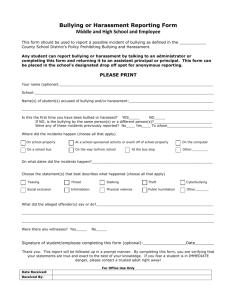
![Bullying and Harassment Advisor role des[...]](http://s3.studylib.net/store/data/006976953_1-320eb77689e1209d082c9ec2464350ee-300x300.png)

